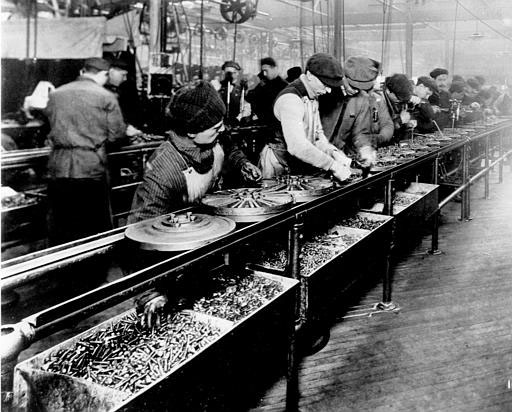Automation is the new assembly line
The “Why technology jobs matter” article was mostly written in response to an argument that cities like Hamilton shouldn’t or can’t focus on multiple sectors, and that we should rely on government investments in a few specific sectors to “position our economy” rather than growing or attracting technology jobs. I ran across a couple articles today that I feel fit in pretty well with my response to the contrary.
First off a report by Oxford researchers has suggested that nearly half off all American jobs are vulnerable to being taken over by computer software over the next 20 years:
“These results were calculated with a common statistical modelling method. More than 700 jobs on O*Net, an online career network, were considered, as well as the skills and education required for each. These features were weighted according to how automatable they were, and according to the engineering obstacles currently preventing computerization.”
 Bad news for workers, right? There’s even some people saying that we’ve reached a point where “technology is destroying more jobs than it creates”. Well, not necessarily. If we go back to the 1800s, prior to machine-assisted mass production and the assembly line, goods were manufactured by craftsman. But the assembly line could mass produce cars and all kinds of products much more efficiently than craftsman, and these became the new jobs.
Bad news for workers, right? There’s even some people saying that we’ve reached a point where “technology is destroying more jobs than it creates”. Well, not necessarily. If we go back to the 1800s, prior to machine-assisted mass production and the assembly line, goods were manufactured by craftsman. But the assembly line could mass produce cars and all kinds of products much more efficiently than craftsman, and these became the new jobs.
What’s happening right now isn’t so different. Automation is becoming so effective that writing computer software to do x, y, z tasks is becoming the new industrial job. Cities that get this are prospering accordingly. Forbes recently went over a report on job growth in US cities:
“But perhaps the biggest takeaway from the map is that while the regions with the most vibrant economies don’t just specialize in one industry or cluster of industries, almost all of them have established tech sectors.
For half of the 20 metros that have added the most jobs per capita since 2010, software publishing is one of the major driver industries.”
What’s great about technology jobs is that they represent true private sector growth – that is, growth that organically breeds even more growth:
But what role does the tech sector have in creating jobs elsewhere in these metros? Just consider San Francisco. It has 30,000 jobs specifically in computer system design services — a detailed industry with a jobs multiplier of 4.35. This means for every one job in the industry, another 3.35 are created in the San Francisco economy. That’s a powerful ripple effect.
The article goes on to describe how even in cities where technology is not a major industry, it is an emerging industry and key driver of growth.
Not to flog a dead horse here, but I just want to reiterate that it’s not a matter of technology being one sector amongst x, y, z other sectors anymore. It’s that technology is taking over x, y, z sectors as they become automatable via computer software.
This really isn’t much different than when assembly lines replaced the craftsman in so many sectors a century ago. If we’re aware of this reality and pursue the opportunities, we can reap the rewards.
